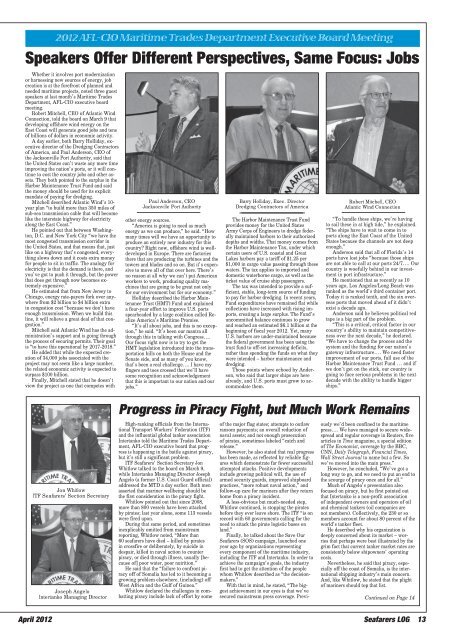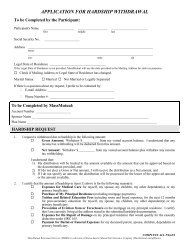Download Current Issue of Seafarers LOG (PDF/6 - The Seafarers ...
Download Current Issue of Seafarers LOG (PDF/6 - The Seafarers ...
Download Current Issue of Seafarers LOG (PDF/6 - The Seafarers ...
You also want an ePaper? Increase the reach of your titles
YUMPU automatically turns print PDFs into web optimized ePapers that Google loves.
2012 AFL-CIO Maritime Trades Department Executive Board Meeting<br />
Speakers Offer Different Perspectives, Same Focus: Jobs<br />
Whether it involves port modernization<br />
or harnessing new sources <strong>of</strong> energy, job<br />
creation is at the forefront <strong>of</strong> planned and<br />
needed maritime projects, noted three guest<br />
speakers at last month’s Maritime Trades<br />
Department, AFL-CIO executive board<br />
meeting.<br />
Robert Mitchell, CEO <strong>of</strong> Atlantic Wind<br />
Connection, told the board on March 9 that<br />
developing <strong>of</strong>fshore wind energy on the<br />
East Coast will generate good jobs and tens<br />
<strong>of</strong> billions <strong>of</strong> dollars in economic activity.<br />
A day earlier, both Barry Holliday, executive<br />
director <strong>of</strong> the Dredging Contractors<br />
<strong>of</strong> America, and Paul Anderson, CEO <strong>of</strong><br />
the Jacksonville Port Authority, said that<br />
the United States can’t waste any more time<br />
improving the nation’s ports, or it will continue<br />
to cost the country jobs and other assets.<br />
<strong>The</strong>y both pointed to the surplus in the<br />
Harbor Maintenance Trust Fund and said<br />
the money should be used for its explicit<br />
mandate <strong>of</strong> paying for dredging.<br />
Mitchell described Atlantic Wind’s 10year<br />
plan “to build more than 350 miles <strong>of</strong><br />
sub-sea transmission cable that will become<br />
like the interstate highway for electricity<br />
along the East Coast.”<br />
He pointed out that between Washington,<br />
D.C. and New York City “we have the<br />
most congested transmission corridor in<br />
the United States, and that means that, just<br />
like on a highway that’s congested, everything<br />
slows down and it costs extra money<br />
for people to sit in traffic. <strong>The</strong> analogy for<br />
electricity is that the demand is there, and<br />
you’ve got to push it through, but the power<br />
that does get through now becomes extremely<br />
expensive.”<br />
He estimated that from New Jersey to<br />
Chicago, energy rate-payers fork over anywhere<br />
from $2 billion to $4 billion extra<br />
in congestion cost “because we don’t have<br />
enough transmission. When we build this<br />
line, it will relieve a great deal <strong>of</strong> that congestion.”<br />
Mitchell said Atlantic Wind has the administration’s<br />
support and is going through<br />
the process <strong>of</strong> securing permits. <strong>The</strong>ir goal<br />
is “to have this operational by 2017-2018.”<br />
He added that while the expected creation<br />
<strong>of</strong> 34,000 jobs associated with the<br />
project may not seem like a large number,<br />
the related economic activity is expected to<br />
surpass $100 billion.<br />
Finally, Mitchell stated that he doesn’t<br />
view the project as one that competes with<br />
Jon Whitlow<br />
ITF <strong>Seafarers</strong>’ Section Secretary<br />
Joseph Angelo<br />
Intertanko Managing Director<br />
Paul Anderson, CEO<br />
Jacksonville Port Authority<br />
other energy sources.<br />
“America is going to need as much<br />
energy as we can produce,” he said. “How<br />
many times will we have an opportunity to<br />
produce an entirely new industry for this<br />
country? Right now, <strong>of</strong>fshore wind is welldeveloped<br />
in Europe. <strong>The</strong>re are factories<br />
there that are producing the turbines and the<br />
towers and blades and so on. But it’s expensive<br />
to move all <strong>of</strong> that over here. <strong>The</strong>re’s<br />
no reason at all why we can’t put American<br />
workers to work, producing quality machines<br />
that are going to be great not only<br />
for our environment but for our economy.”<br />
Holliday described the Harbor Maintenance<br />
Trust (HMT) Fund and explained<br />
a four-year effort to improve U.S. ports<br />
spearheaded by a large coalition called Realize<br />
America’s Maritime Promise.<br />
“It’s all about jobs, and this is no exception,”<br />
he said. “It’s been our mantra all<br />
through this in talking with Congress….<br />
Our focus right now is to try to get the<br />
HMT legislation introduced into the transportation<br />
bills on both the House and the<br />
Senate side, and as many <strong>of</strong> you know,<br />
that’s been a real challenge…. I have my<br />
fingers and toes crossed that we’ll have<br />
some recognition and acknowledgement<br />
that this is important to our nation and our<br />
jobs.”<br />
High-ranking <strong>of</strong>ficials from the International<br />
Transport Workers’ Federation (ITF)<br />
and the influential global tanker association<br />
Intertanko told the Maritime Trades Department,<br />
AFL-CIO executive board that progress<br />
is happening in the battle against piracy,<br />
but it’s still a significant problem.<br />
ITF <strong>Seafarers</strong>’ Section Secretary Jon<br />
Whitlow talked to the board on March 9,<br />
while Intertanko Managing Director Joseph<br />
Angelo (a former U.S. Coast Guard <strong>of</strong>ficial)<br />
addressed the MTD a day earlier. Both men<br />
asserted that mariner wellbeing should be<br />
the first consideration in the piracy fight.<br />
Whitlow pointed out that since 2008,<br />
more than 800 vessels have been attacked<br />
by pirates; last year alone, some 113 vessels<br />
were fired upon.<br />
During that same period, and sometimes<br />
inexplicably omitted from mainstream<br />
reporting, Whitlow noted, “More than<br />
60 seafarers have died – killed by pirates<br />
in crossfire or deliberately, by suicide in<br />
despair, killed in naval action to counter<br />
piracy, or died through illness, usually [because<br />
<strong>of</strong>] poor water, poor nutrition.”<br />
He said that the “failure to confront piracy<br />
<strong>of</strong>f <strong>of</strong> Somalia has led to it becoming a<br />
growing problem elsewhere, (including) <strong>of</strong>f<br />
West Africa and the Gulf <strong>of</strong> Guinea.”<br />
Whitlow declared the challenges in combatting<br />
piracy include lack <strong>of</strong> effort by some<br />
Barry Holliday, Exec. Director<br />
Dredging Contractors <strong>of</strong> America<br />
<strong>The</strong> Harbor Maintenance Trust Fund<br />
provides money for the United States<br />
Army Corps <strong>of</strong> Engineers to dredge federally<br />
maintained harbors to their authorized<br />
depths and widths. That money comes from<br />
the Harbor Maintenance Tax, under which<br />
certain users <strong>of</strong> U.S. coastal and Great<br />
Lakes harbors pay a tariff <strong>of</strong> $1.25 per<br />
$1,000 in cargo value passing through these<br />
waters. <strong>The</strong> tax applies to imported and<br />
domestic waterborne cargo, as well as the<br />
ticket value <strong>of</strong> cruise ship passengers.<br />
<strong>The</strong> tax was intended to provide a sufficient,<br />
stable, long-term source <strong>of</strong> funding<br />
to pay for harbor dredging. In recent years,<br />
Fund expenditures have remained flat while<br />
collections have increased with rising imports,<br />
creating a large surplus. <strong>The</strong> Fund’s<br />
uncommitted balance continues to grow<br />
and reached an estimated $6.1 billion at the<br />
beginning <strong>of</strong> fiscal year 2012. Yet, many<br />
U.S. harbors are under-maintained because<br />
the federal government has been using the<br />
trust fund to <strong>of</strong>f-set increasing deficits,<br />
rather than spending the funds on what they<br />
were intended – harbor maintenance and<br />
dredging.<br />
Those points where echoed by Anderson,<br />
who said that larger ships are here<br />
already, and U.S. ports must grow to accommodate<br />
them.<br />
<strong>of</strong> the major flag states; attempts to outlaw<br />
ransom payments; an overall reduction <strong>of</strong><br />
naval assets; and not enough prosecution<br />
<strong>of</strong> pirates, sometimes labeled “catch and<br />
release.”<br />
However, he also stated that real progress<br />
has been made, as reflected by reliable figures<br />
which demonstrate far fewer successful<br />
attempted attacks. Positive developments<br />
include growing political will, the use <strong>of</strong><br />
armed security guards, improved shipboard<br />
practices, “more robust naval action,” and<br />
follow-up care for mariners after they return<br />
home from a piracy incident.<br />
A less-obvious but much-needed step,<br />
Whitlow continued, is stopping the pirates<br />
before they ever leave shore. <strong>The</strong> ITF “is on<br />
record with 60 governments calling for the<br />
need to attack the pirate logistic bases on<br />
land.”<br />
Finally, he talked about the Save Our<br />
<strong>Seafarers</strong> (SOS) campaign, launched one<br />
year ago by organizations representing<br />
every component <strong>of</strong> the maritime industry,<br />
including the ITF and Intertanko. In order to<br />
achieve the campaign’s goals, the industry<br />
first had to get the attention <strong>of</strong> the people<br />
whom Whitlow described as “the decisionmakers.”<br />
With that in mind, he stated, “<strong>The</strong> biggest<br />
achievement in our eyes is that we’ve<br />
secured mainstream press coverage. Previ-<br />
Robert Mitchell, CEO<br />
Atlantic Wind Connection<br />
“To handle these ships, we’re having<br />
to sail these in at high tide,” he explained.<br />
“<strong>The</strong> ships have to wait to come in to<br />
ports along the East Coast <strong>of</strong> the United<br />
States because the channels are not deep<br />
enough.”<br />
Anderson said that all <strong>of</strong> Florida’s 14<br />
ports have lost jobs “because those ships<br />
are not able to call at our ports 24/7…. Our<br />
country is woefully behind in our investment<br />
in port infrastructure.”<br />
He mentioned that as recently as 10<br />
years ago, Los Angeles/Long Beach was<br />
ranked as the world’s third container port.<br />
Today it is ranked tenth, and the six overseas<br />
ports that moved ahead <strong>of</strong> it didn’t<br />
exist a decade ago.<br />
Anderson said he believes political red<br />
tape is a big part <strong>of</strong> the problem.<br />
“This is a critical, critical factor in our<br />
country’s ability to maintain competitiveness<br />
over the next decade,” he declared.<br />
“We have to change the process and the<br />
system and the funding for our nation’s<br />
gateway infrastructure…. We need faster<br />
improvement <strong>of</strong> our ports, full use <strong>of</strong> the<br />
Harbor Maintenance Trust Fund … and if<br />
we don’t get on the stick, our country is<br />
going to face serious problems in the next<br />
decade with the ability to handle bigger<br />
ships.”<br />
Progress in Piracy Fight, but Much Work Remains<br />
ously we’d been confined to the maritime<br />
press…. We have managed to secure widespread<br />
and regular coverage in Reuters, five<br />
articles in Time magazine, a special edition<br />
<strong>of</strong> <strong>The</strong> Economist, coverage by the BBC,<br />
CNN, Daily Telegraph, Financial Times,<br />
Wall Street Journal to name but a few. So<br />
we’ve moved into the main press.”<br />
However, he concluded, “We’ve got a<br />
long way to go, and we need to put an end to<br />
the scourge <strong>of</strong> piracy once and for all.”<br />
Much <strong>of</strong> Angelo’s presentation also<br />
focused on piracy, but he first pointed out<br />
that Intertanko is a non-pr<strong>of</strong>it association<br />
<strong>of</strong> independent owners and operators <strong>of</strong> oil<br />
and chemical tankers (oil companies are<br />
not members). Collectively, the 230 or so<br />
members account for about 80 percent <strong>of</strong> the<br />
world’s tanker fleet.<br />
He described why his organization is<br />
deeply concerned about its market – worries<br />
that perhaps were best illustrated by the<br />
grim fact that current tanker market rates are<br />
consistently below shipowners’ operating<br />
costs.<br />
Nevertheless, he said that piracy, especially<br />
<strong>of</strong>f the coast <strong>of</strong> Somalia, is the international<br />
shipping industry’s main concern.<br />
And, like Whitlow, he stated that the plight<br />
<strong>of</strong> mariners should top that list.<br />
Continued on Page 14<br />
April 2012 <strong>Seafarers</strong> <strong>LOG</strong> 13



